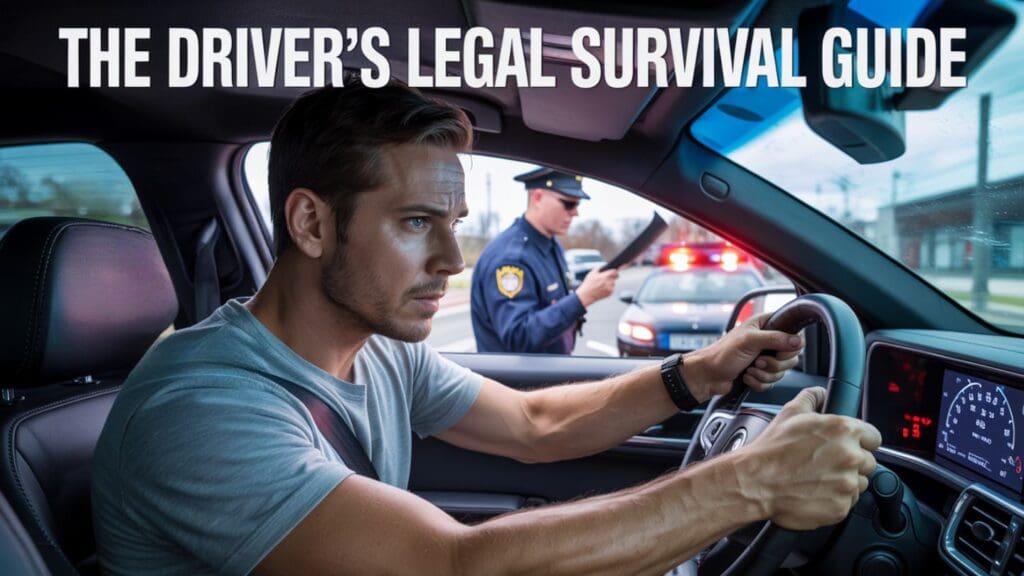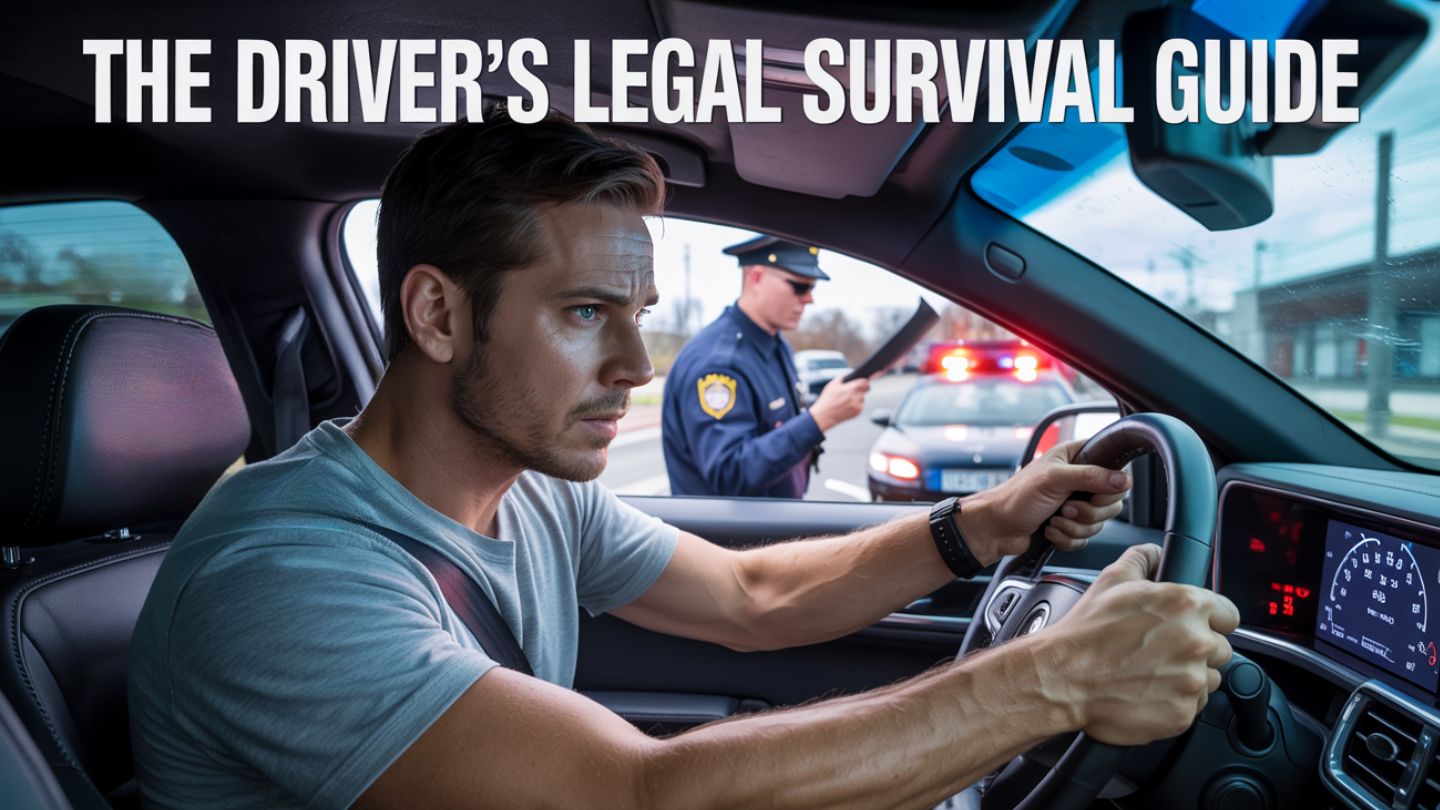If you’re dealing with a driver’s license suspension, you need clear, practical advice to navigate through it. ‘The Driver’s Legal Survival Guide Suspensions’ provides the essential steps and insights to help you understand the causes, consequences, and solutions for license suspensions. This blog will walk you through the reasons behind suspensions, legal penalties, reinstatement procedures, and more, ensuring you’re well-prepared to manage and resolve your situation effectively.
Key Takeaways
- Understanding the reasons for license suspensions, such as traffic violations and non-compliance with legal requirements, is crucial for regaining driving rights.
- Driving with a suspended license carries severe penalties, including fines, jail time, and negative impacts on both your driving record and insurance rates.
- Enrolling in defensive driving courses and seeking legal assistance can enhance driving skills and facilitate the reinstatement process, helping to prevent future violations.
Understanding License Suspensions
Understanding the reasons behind a driver’s license suspension is the first step towards regaining your driving rights. Common reasons include accumulating traffic violations, driving under the influence (DUI), and non-traffic-related offenses such as failing to pay child support. From DUIs and license suspensions to mandatory education programs, understanding the realities and legalities of drunk driving helps drivers avoid irreversible damage to their records and safety.
Reckless driving is another significant reason for license suspensions. Reckless driving involves operating a vehicle with willful disregard for safety, which can include excessive speeding and aggressive driving. Accumulating 12 or more points on your driving record in Nevada, for example, can lead to a suspension for up to six months. Understanding these reasons is crucial for taking corrective actions and avoiding future suspensions.
Staying proactive with responsible driving habits and timely compliance with legal requirements can help prevent complications related to driving privileges. Awareness of the causes and consequences of license suspensions helps maintain driving rights and ensures visibility for a smoother path to reinstatement.
Legal Penalties for Driving with a Suspended License

Driving with a suspended license can lead to severe legal and financial consequences. Fines for this violation can vary significantly by state, ranging from a few hundred to several thousand dollars. In some states, repeat offenders face mandatory minimum jail sentences, underscoring the seriousness of this offense.
Beyond fines and possible jail time, driving with a suspended license can result in additional penalties such as extended suspension periods and increased insurance rates. Specific traffic violations, such as reckless driving or distracted driving, can compound these penalties. For instance, reckless driving charges often come with hefty fines and the risk of jail time, further complicating your driving record and legal standing.
Driving with a suspended license is typically classified as a misdemeanor, which can lead to a criminal record. This classification means that even a minor traffic violation like speeding or running stop signs can escalate into significant legal trouble. Depending on the state, misdemeanors can carry varying degrees of penalties, but they all add extra time and complexity to resolving your driving issues.
Avoiding these complications requires strict adherence to traffic laws and prompt resolution of any errors that could lead to a license suspension. Understanding the potential penalties and taking proactive steps helps avoid the pitfalls of driving with a suspended license and aids in reinstating driving privileges.
Steps to Reinstating Your License
Reinstating your license involves addressing the underlying issues that led to the suspension. This may include paying fines, attending court hearings, or completing mandatory programs such as alcohol education classes, depending on the reason for your suspension. Adequate insurance coverage is necessary if your suspension was due to driving without insurance.
Adhering to the instructions outlined in your suspension notice is necessary. The notice usually includes specific requirements that must be met before proceeding with reinstatement. In some cases, waiting out the designated suspension period may be sufficient, but verifying this with your local DMV is important.
Once you have fulfilled all the necessary requirements, you will need to submit a reinstatement application to the DMV. This application should include personal details, proof of program completion, and payment of any reinstatement fees. An attorney can be invaluable in this process, helping to expedite the steps and ensure all conditions are met.
Applying for an Occupational Driver’s License

An Occupational Driver’s License (ODL) might be a viable solution for those unable to drive due to a license suspension. This type of license allows individuals to drive for essential purposes such as work or school, even if their regular license has been suspended. Eligibility for an ODL varies, but it is often granted following a suspension for reasons like reckless driving, provided certain conditions are met.
The application process for an ODL can be complex. In Texas, for example, you must secure a court order authorizing the Texas Department of Public Safety (DPS) to issue the license. You’ll need to file a Petition for an ODL in the court that issued your suspension or in your county if the suspension wasn’t related to a conviction. Required documents include a certified abstract of your driving record and proof of an essential need to drive, such as a job or school schedule.
Additionally, applicants are required to provide proof of SR-22 insurance, demonstrating they have the minimum liability insurance mandated by law. In cases where the suspension was due to a drug or alcohol offense, installing an ignition interlock device may also be necessary before obtaining an ODL.
Meeting these requirements and preparing accordingly can streamline the process to proceed with obtaining an ODL.
Impact on Insurance and Driving Record

A suspended license severely damages your driving record and reputation with insurers. Points added to your record can trigger higher premiums, further suspensions, and make reinstatement more difficult. Speeding, red-light violations, and improper turns are just a few of the common traffic tickets in Texas. Knowing how to respond, whether through defensive driving courses or legal representation, can help mitigate penalties and keep your record clean.
Moreover, insurance companies view driving with a suspended license as a high-risk behavior, leading to higher insurance premiums. This increase in rates can be substantial, further stressing the importance of maintaining a clean driving record. Understanding these consequences helps prevent future complications and allows for responsible management of driving privileges.
Taking proactive steps, such as enrolling in defensive driving courses or seeking legal counsel, can help mitigate these impacts. Awareness of how a suspended license affects your driving record and insurance enables informed decisions to protect your driving rights and financial well-being.
Defensive Driving Courses: A Path to Prevention
Defensive driving courses offer a proactive approach to preventing license suspensions and improving overall road safety. These courses enhance your skills in managing unexpected road situations, which is vital for safe driving. Defensive driving education enhances your awareness of potential hazards, helping you manage risks and avoid accidents.
Completing a defensive driving course offers several benefits:
- Reduction of points on your driving record, potentially avoiding fines and further license suspensions.
- Fostering greater confidence behind the wheel, reducing the likelihood of risky driving behavior.
- Availability in both online and in-person formats, catering to different learning preferences and schedules.
If you ever misplace your driver’s ed certificate, here’s what to do next.
In Texas, a defensive driving class typically:
- Lasts six hours
- Covers essential topics such as hazard recognition and accident prevention techniques
- Costs only $25, making it an affordable option for improving driving skills and maintaining a clean record
Enrolling in a defensive driving course once every 12 months is the best way to stay safe and responsible on the road. This computer course can also provide a valuable review of essential driving skills and security for drivers, making you more aware of important safety practices while commuting in a car.
Legal Representation for License Suspensions
Navigating the complexities of a license suspension can be overwhelming, which is why hiring an attorney is highly beneficial. Experienced attorneys understand DMV procedures and can ensure correct document filing and adherence to deadlines. This expertise is invaluable in protecting your rights and navigating the reinstatement process.
Many suspended license lawyers offer a free consultation to assess your case and develop personalized defense strategies. Having legal representation during DMV hearings allows for effective advocacy, including cross-examination of witnesses and presenting evidence for the prosecution. This ensures fair treatment and scrutiny by the judge to represent the evidence against you.
An attorney can expedite the process of license reinstatement, guiding you through the necessary steps and conditions. Consulting a lawyer helps navigate the legal landscape and work towards regaining driving privileges efficiently.
Handling DUI and Reckless Driving Cases
Handling DUI and reckless driving cases requires a strong defense strategy to navigate the legal challenges effectively. A key aspect of defending against a DUI charge involves challenging the legality of the traffic stop that led to the arrest. Additionally, critiques of field sobriety tests can be made based on improper administration or external factors affecting performance.
Contesting the reliability of breathalyzer and chemical test results is another common defense strategy in DUI cases. Legal assistance significantly improves the chances of effectively challenging DUI charges. Reckless driving, defined as operating a vehicle with willful disregard for safety, includes behaviors like excessive speeding and aggressive driving.
Having a strong defense strategy is crucial when dealing with DUI and reckless driving cases. Legal assistance can help you navigate these complex cases, improve your chances of a favorable outcome, and ultimately protect your driving rights while fighting for justice.
Maintaining a Clean Driving Record
Maintaining a clean driving record is crucial to avoiding license suspensions and legal issues. Key practices for safe driving include:
- Adhering to speed limits
- Avoiding distracted driving
- Taking a defensive driving course, which can improve driving skills and potentially reduce points on your record, helping prevent future violations.
A clean driving record not only prevents suspensions but can also lead to lower insurance premiums and increased road safety. Understanding the importance of maintaining a clean record allows for proactive steps to ensure long-term driving privileges and financial benefits.
Final Thoughts
Navigating a license suspension requires understanding its causes, legal consequences, and the path to reinstatement. This blog outlines key strategies, including recognizing common suspension triggers like DUIs and traffic violations, the penalties for driving while suspended, and the role of defensive driving courses in reducing points and improving safety. It also explains how to apply for an Occupational Driver’s License and why legal representation is vital for reinstatement. Maintaining a clean driving record and taking proactive steps are essential to protect both your driving privileges and insurance rates.
Court-approved defensive Driving offers essential support through its defensive driving course in El Paso, helping drivers meet legal requirements while improving their driving skills. Whether you’re working to dismiss a ticket or reduce points, our state-approved course provides a simple, affordable, and effective solution to regain control of your driving future.
Frequently Asked Questions
What is the cost of the Texas Defensive Driving Course?
The Texas Defensive Driving Course typically costs around $25. This affordable option provides an effective way to fulfill defensive driving requirements.
How long does a Texas Defensive Driving Class typically last?
A Texas Defensive Driving Class typically lasts six hours. This duration is designed to cover all necessary material effectively.
How often can you take a defensive driving course for ticket dismissal in Texas?
You can take a defensive driving course for ticket dismissal in Texas once every 12 months. This allows you to keep your driving record clean more frequently.
How many modules are in the defensive driving course in Texas?
Texas defensive driving courses typically contain between six and twelve modules, varying by program design.
Is it mandatory to take a state-approved defensive driving course in Texas for ticket dismissal?
Yes, in Texas, completing a state-approved defensive driving course is typically mandatory for ticket dismissal as mandated by the courts.



